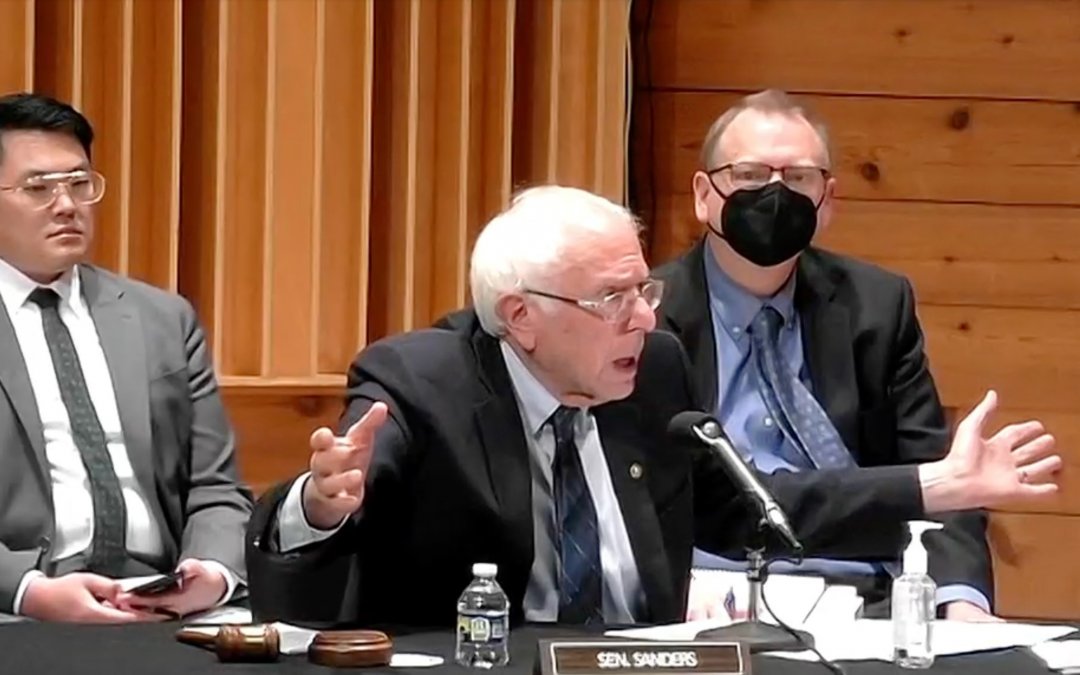WASHINGTON – Hundreds of nurses at Robert Wood Johnson University Hospital expressed frustration with hospital executives, staffing ratios and worker and patient safety during Sen. Bernie Sanders’ (I-Vt.) solo Senate field hearing on Friday amidst their three-month-long unfair labor practice strike.
During an emotional Senate Health, Education, Labor and Pensions Committee hearing, 1,700 frontline nurses from RWJ Barnabas Health, the largest academic health system in New Jersey, marked their 85th day picketing while the Vermont senator listened to their concerns.
“Hospitals understaff their floors, which puts nurses in difficult, if not outright impossible, situations, which can leave them spread too thin or at risk of getting hurt on the job,” said Judith Danella, who has worked as a staff nurse at Barnabas for 28 years. She also serves as the president of the United Steelworkers Local 4-200, which represents the striking nurses.
“This vicious cycle makes it harder to recruit new nurses,” she said.
Pandemic burnout exacerbated staffing issues, straining the health care system and frontline nurses, especially. The U.S. Bureau of Labor Statistics projects that over 275,000 additional nurses are needed from 2020 to 2030. However, by 2027, nearly one-fifth of the 4.5 million registered nurses in the U.S. intend to leave the workforce as a result of shortages exacerbated by the pandemic, according to a research study by the National Council of State Boards of Nursing.
Both nurses and Sanders expressed support for mandated nurse-patient staffing regulations modeled off of legislation in California and those implemented in some New York City hospitals following strikes there in January to increase job satisfaction and safety. Hospitals are generally opposed to such regulations.
“With tears in their eyes, nurses have told me that they are simply unable to provide the quality care they want to provide and the care their patients deserve,” said Sanders when reflecting on his conversations with the nurses.
Sanders, who chairs the committee, was the only senator present from either side of the aisle. Ranking Member Sen. Bill Cassidy (R-La.) expressed concern about the “partisan” hearing.
“Conducting a field hearing on this topic in New Jersey, less than two miles from the nurses’ picket line, reinforces that this hearing is intended to manipulate federal labor proceedings and send a signal of political support for one side in an ongoing labor strike,” Cassidy said in a statement. The Republican called Sanders’ claims of unfair labor conditions and that the hospital was negotiating in bad faith “unsubstantiated.”
Sparring views between the chairman and ranking member continue following the committee’s passage of the Bipartisan Primary Care and Health Workforce Act, borne out of a collaboration between Sanders and Sen. Roger Marshall (R-Kan.). The bill directs $26 billion to address medical workforce shortages, including a $1.2 billion investment towards college and university grants to attract more students to nursing professions. Cassidy expressed concerns about where funding for the bill would be coming from.
Robert Wood Johnson hospital executives also expressed similar distress about the hearing. Mark Manigan, President and Chief Executive Officer of RWJBarnabas Health, and Alan Lee, the CEO of the non-profit Robert Wood Johnson University Hospital, were both invited to testify but did not attend.
“I am troubled by the inaccurate and misleading assertions put forth by the Chairman,” said Manigan in a written testimony. The hospital’s negotiation team met with the nurses union six times since the beginning of October, the executive said, with the most recent meeting being on Oct. 22. A hospital spokesperson said that there is no date set for the next bargaining session.
Manigan advocated for more hospital funding rather than legislative oversight, such as staffing requirements, to address shortages. Nurses and Sanders, however, said they were disappointed in his lack of attendance and negotiations so far.
“I was also interested in learning how they could afford to pay their CEO over $17 million in compensation in 2021, but apparently cannot afford to mandate the same safe nurse-patient ratios that have been in place in California for nearly 20 years,” Sanders said in a statement on Thursday following notice that the executives would not be attending.
Nurses also pointed to the approximately $100 million dollars the health system has expensed on temporary nurse replacements during the strike, money that could have been put towards their demands, they said.
“Nurses are not about propaganda. Looking good on paper is not the goal. Delivering quality care is,” said pediatric nurse Carol Tanzi, who has worked with Barnabas for 25 years.
Speaking to a crowd of 700 nurses at Rutgers University’s Nicholas Music Center, Sanders was met with a standing ovation from the audience and witnesses.
“In my view, there are very few professions in America that are more important than nursing,” said Sanders. “You are there, and we thank you.”
Sanders said addressing health care workforce shortages is one of the committee’s legislative priorities.

